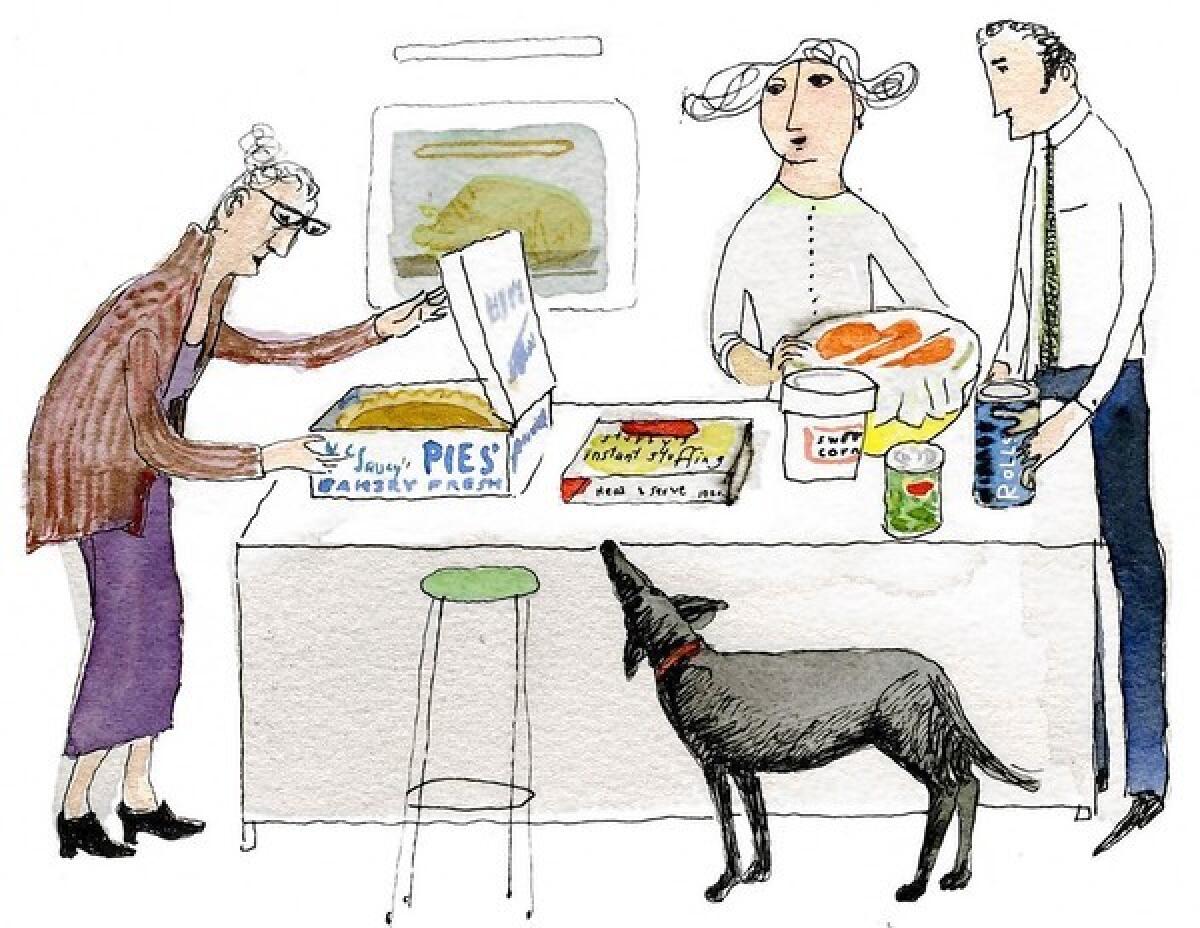Family changes affect holiday get-togethers: How to cope

- Share via
My fiancé tossed out the remark as a compliment to my mom, but she didn’t take it that way: “I sure miss your pecan pie,” he said to her as our Thanksgiving dinner drew to a close.
“I’m sorry,” my mother answered, her eyes welling with tears.
Mom had always prided herself on her baking prowess: pastries, from-scratch birthday cakes, doughnuts. At Christmas, she’d bake 15 kinds of cookies; at Easter, she’d make chocolate-dipped candies; at Thanksgiving, at least three pies were on the table: pecan, mincemeat and pumpkin.
But dementia had slowly robbed her of this talent, just as it had robbed her of the ability to do other things she’d once loved. Now our Thanksgiving dinner was potluck, and the pies came from a store.
I fervently wished things could be the way they once were. But it was impossible, and so we were coping, just like many other families are forced to do on the holiday. Change is inevitable: Divorce, marriage, children, illness, death — all alter the dynamic of family get-togethers. The trick is to adapt and craft new traditions when the old ones vanish.
“There’s a lot of emotional money in the bank when it comes to holidays,” said Christine Carter, executive director of UC Berkeley’s Greater Good Science Center, which examines the underpinnings of happiness, social bonding and altruism.
“It’s a stressful time because of people’s expectations. But it’s also a time that has great potential to raise the happiness level in your life if you find a way to deepen your family ties despite the changes taking place.”
That’s the goal of some friends who lost their dad last summer; their mom, who once cooked bounteous holiday meals, died years ago. Would they end the tradition of having Thanksgiving dinner at the family home? The three siblings debated the issue for months: They couldn’t decide whether to try something new or return to their parents’ now-empty house.
“We’re going to do it the old way one more time,” Sheri Owens told me last week.
On Wednesday, she and her husband and daughter will drive 400 miles from their home in Tucson to spend the holiday in Southern California with Owens’ brother and sister. They’ll get out the old recipes and cook the meal exactly as Moma Belle cooked it for decades. “My brother thinks it might bring us closure. And I think we’ll have a good time just being together again,” she said.
Another friend, whose grandfather died last month, said his family can’t cope with celebrating the holiday at home. The grief is too raw. The family plans to go away for the holiday.
Will that become a new tradition? It’s probably too soon for anyone to predict. But gerontologist Pauline Abbott said there’s value in establishing new traditions after a change in the family. “Sometimes we need to find new solutions, to carve it differently,” said Abbott, who directs the Institute of Gerontology at Cal State Fullerton.
Brea resident Bonnie Rosell agrees that “there comes a time you have to let go,” but she hopes that will be far in the future. In the meantime, the 82-year-old retired educator is adapting to changes as she ages. The mother of nine and grandmother of 50, Rosell still will have as many as 65 people joining her for dinner next week. But she doesn’t try to do it all herself anymore.
“They worry about me,” she said, referring to her brood. “Every year they say, ‘We’ll come this year,’ sort of implying it will be the last, but they keep on coming.” Family members prepare more of the dinner now, but Rosell will still pop two turkeys and three chicken breasts into the oven.
Pat Moylan, mother of 10, has taken the opposite tack. She lets her kids host the dinner now. Moylan, 78, lives in Casa Dorinda, a life-care facility in Montecito. Her daughter, Laura Love, has held a large turkey day gathering — as many as 45 guests — for the past few years at her farm in Lodi, Wis. Moylan hops on a plane for the annual family reunion. “My daughter is very organized, and everything operates smoothly,” she said. “The older children take care of the younger ones, and all the cousins get to be friends. I love to be in the midst of it all.”
That’s the way it should be, said Carter, the UC Berkeley scientist who studies happiness. Older relatives should be included in the day’s activities, if possible.
“Instead of letting them spend the whole day at home waiting to be picked up for a one-hour dinner, let them spend the day with you,” she said. “Include them in the preparations; let them feel the buzz and hubbub of the day. There’s always something you can give them to do that will make them feel like they’re useful and contributing.”
Life moves on. We need to adapt to it.
“We always want things to be as they once were,” said gerontologist Shawn Herz, director of programs at the Los Angeles Caregiver Resource Center, a USC program.
“You don’t want people to feel worthless because they’re not making their special pie anymore. It’s not about the pie or the turkey. It’s about the people we love.”
McClure’s column on caring for and staying connected with aging parents appears monthly.


